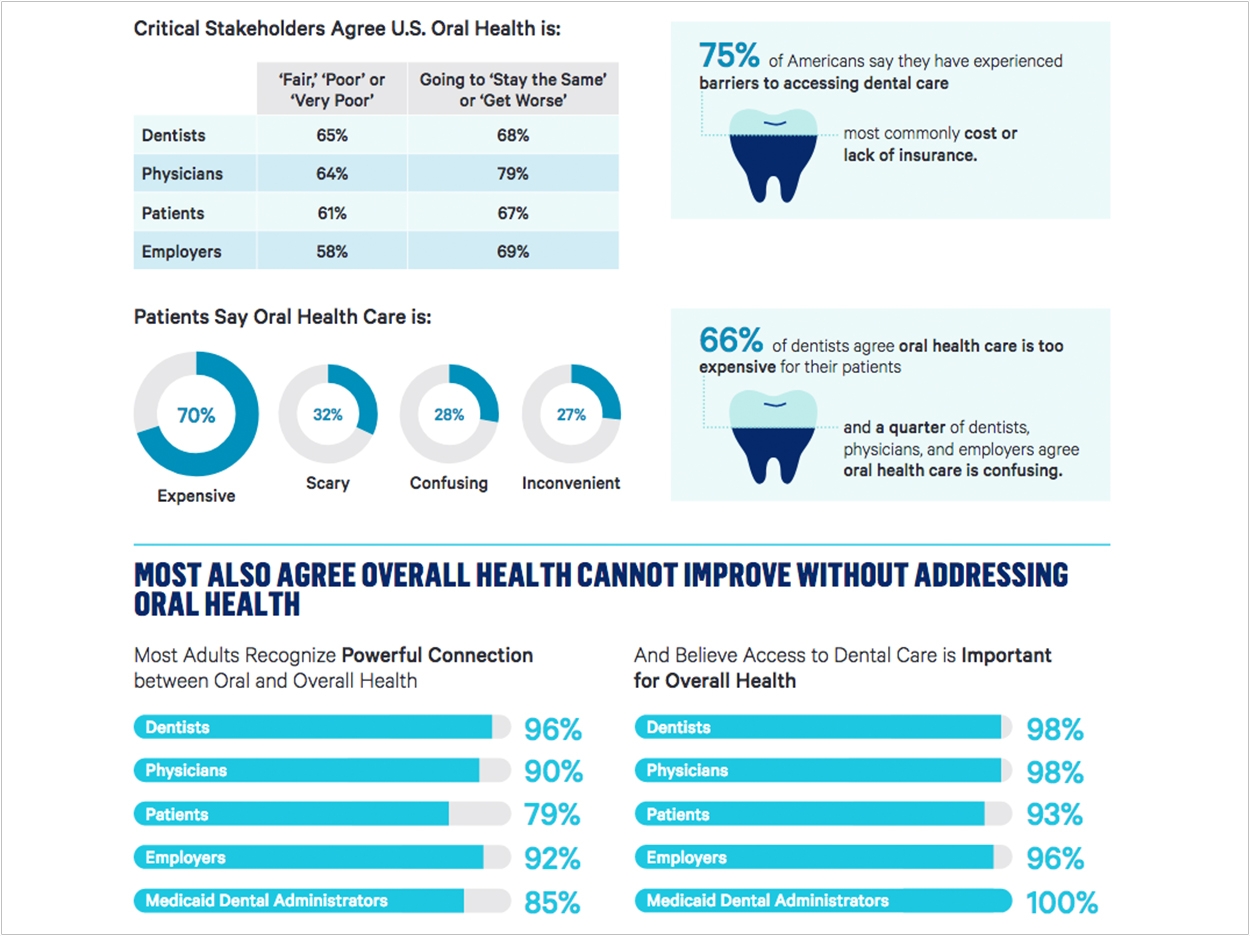
Six in 10 Americans rate their oral health as fair, poor, or very poor, according to a survey commissioned by DentaQuest and conducted by KRC Research. Also, 51% of patients are concerned about their oral health, making it the top health concern over heart, eye, digestive, mental, and skin health.
Yet 75% of Americans say they have encountered barriers to accessing dental care, chiefly cost (52%) and lack of insurance (31%). Despite these challenges, DentaQuest reports, dentists, physicians, and employers agree on solutions to improve the oral health system in the United States.
The survey polled more than 2,300 Americans, including dentists, physicians, patients, employee benefits administrators, and Medicaid dental administrations. Its corresponding research report, “Reversible Decay: Oral Health Is a Public Health Problem We Can Solve,” represents a unique 360° view of common concerns and potential solutions for America’s oral healthcare challenges, according to DentaQuest.
For example, the survey found that America’s oral health system is failing and unlikely to improve despite the connection between oral health and overall health. In fact, more than 90% of dentists and physicians and 79% of patients recognize a demonstrable connection between oral health and overall health.
Patients say that oral healthcare is expensive (70%), scary (32%), confusing (28%), and inconvenient (27%). Also, 66% of dentists agree that oral healthcare is too expensive for their patients, and one in four dentists, physicians, and employers agree that oral healthcare is confusing. Further, eight in 10 physicians predict that Americans’ oral health will either stay the same or get worse, and two in three dentists, patients, and employers agree.
Next, most Americans are misinformed or unsure about dental coverage under Medicaid and Medicare. According to the survey, 74% of patients are either unsure if Medicaid includes dental benefits or believe it does, while 62% are either unsure if Medicare includes dental benefits or believe it does. Plus, most patients believe that Medicare (80%) and Medicaid (78%) should cover dental care.
“An estimated 74 million Americans do not have access to oral healthcare, despite evidence linking oral health to overall health,” said Steve Pollock, president and chief executive officer of DentaQuest.
“As a result, many Americans forgo preventive dental care or seek treatment in ill-equipped emergency rooms, both of which contribute to rising overall health costs. But there is cause for optimism. Patients, dentists, and physicians agree on what it will take to improve Americans’ oral and overall health,” said Pollock.
Key stakeholders agree on the solutions to America’s oral health challenges, though, with 93% of dentists, 86% of physicians, and 82% of employers agreeing that greater collaboration across medical and dental providers would improve patient care.
To that end, dentists believe innovative practices can be effective for overcoming patient barriers to care, such as school-based dentistry (68%), collaborative care teams (64%), and wraparound services like transportation or child care (46%).
Also, the survey found that more than four in 10 employers are open to considering innovations in employee benefits. Innovations include providing medical screenings and associated referrals to health professionals and providing convenient access to urgent dental care.
Of note, DentaQuest said, patients and employers support dental insurance models that emphasize value of care over volume of procedures. Nearly half of patients, 48%, think dental insurance should be based primarily on the impact the procedure will have on overall health, not on the procedures’ total cost.
Most employers (87%) agree that oral health benefits should prioritize healthy outcomes over volume of services delivered. And, more than half of employers (51%) say their organizations would be interested in implementing a value-based care benefit design for dental coverage.
“This research underscores what DentaQuest has known for a long time—that our current oral health system is failing millions of Americans, despite the crucial role it plays in our overall health,” Pollock said.
“Fortunately, these survey findings demonstrate clear support from key stakeholders on how to improve the oral health system. At DentaQuest, we recognize the need to revolutionize oral healthcare by taking a prevention-first approach with value-based care models, improved access, medical-dental integration, and expanded adult benefits,” Pollock said.
Related Articles
DentaQuest Awards $6.1 Million to Oral Health Initiatives
Kids Seeing Fewer Caries and Adults Keeping More Teeth
Poor Oral Health Linked to Cognitive Decline



